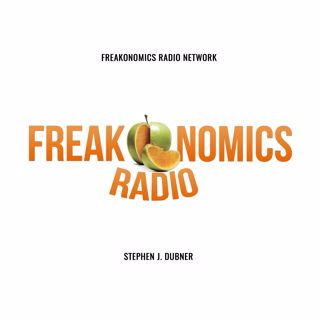Om avsnittet
Only a tiny number of “supertaskers” are capable of doing two things at once. The rest of us are just making ourselves miserable, and less productive. How can we put the — hang on a second, I've just got to get this.Come see Stephen Dubner live! “A Questionable Evening: A strategic interrogation from two people who ask questions for a living,” featuring Stephen Dubner and PJ Vogt from Search Engine.Thursday, Sept. 26th, at the Bell House in Brooklyn, NY. https://www.eventbrite.com/e/a-questionable-evening-evening-with-stephen-dubner-and-pj-vogt-tickets-1002544747327 SOURCES:Olivia Grace, senior product manager at Slack.Gloria Mark, professor of computer science at the University of California, Irvine.David Strayer, professor of cognition and neural science at the University of Utah. RESOURCES:"Immersion in Nature Enhances Neural Indices of Executive Attention," by Amy S. McDonnell and David L. Strayer (Nature: Scientific Reports, 2024)."Contribution to the Study on the ‘Right to Disconnect’ From Work. Are France and Spain Examples for Other Countries and E.U. Law?" by Loïc Lerouge and Francisco Trujillo Pons (European Labour Law Journal, 2022)."Task Errors by Emergency Physicians Are Associated With Interruptions, Multitasking, Fatigue and Working Memory Capacity: A Prospective, Direct Observation Study," by Johanna I. Westbrook, Magdalena Z. Raban, Scott R. Walter, and Heather Douglas (BMJ Quality & Safety, 2018)."Supertaskers: Profiles in Extraordinary Multitasking Ability," by Jason M. Watson and David L. Strayer (Psychonomic Bulletin & Review, 2010)."The Effects of Video Game Playing on Attention, Memory, and Executive Control," by Walter R. Boot, Arthur F. Kramer, Daniel J. Simons, Monica Fabiani, and Gabriele Gratton (Acta Psychologica, 2008)."'Constant, Constant, Multi-Tasking Craziness': Managing Multiple Working Spheres," by Victor M. González and Gloria Mark (Proceedings of the 2004 Conference on Human Factors in Computing Systems, CHI, 2004). EXTRAS:"Why Is the U.S. So Good at Killing Pedestrians?" by Freakonomics Radio (2023)."Why Did You Marry That Person?" by Freakonomics Radio (2022)."How Much Should We Be Able to Customize Our World?" by No Stupid Questions (2021).

